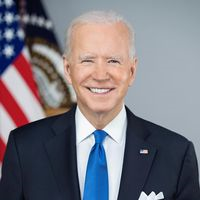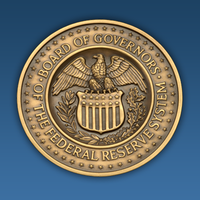The Tug of War Over the Federal Reserve: Trump’s Call for Presidential Influence
August 13, 2024, 4:33 am

Location: United States, District of Columbia, Washington
Employees: 1001-5000
Total raised: $500K

Location: United States, California, San Francisco
Employees: 1001-5000
Founded date: 2011
The Federal Reserve, the backbone of the U.S. economy, has long stood as a fortress of independence. Since the Treasury-Fed Accord of 1951, it has operated free from the whims of political leaders. This separation was designed to protect monetary policy from the stormy seas of political influence. However, recent remarks from former President Donald Trump signal a potential shift in this long-standing tradition.
At a press conference held at his Mar-a-Lago estate, Trump suggested that the President should have a greater say in Federal Reserve decisions. He argued that the Fed has “gotten it wrong a lot,” pointing fingers at current Chair Jerome Powell, whom he appointed in 2017. Trump’s perspective is rooted in his belief that monetary policy is as much about instinct as it is about data. He claimed that his business acumen gives him a sharper intuition than many Fed officials.
This isn’t just a casual comment. It’s a shot across the bow of the Fed’s independence. Trump’s call for more executive influence raises eyebrows and stirs debate. Historically, the Fed has been a sanctuary from political pressure. Its governors serve long terms, designed to outlast any single administration. This structure aims to ensure that monetary policy remains focused on economic fundamentals rather than political expediency.
Trump’s remarks come at a time when the Fed faces pressure to cut interest rates to stave off a potential recession. The economy is a delicate balance, and interest rates are a critical lever. Lowering rates can stimulate growth, but it can also fan the flames of inflation. Trump’s desire for a more hands-on approach reflects a broader trend where political leaders seek to influence economic policy directly.
Critics of Trump’s stance argue that such influence could lead to disastrous consequences. The history of the Fed is littered with examples of political meddling leading to economic turmoil. The 1972 presidential election serves as a cautionary tale. President Richard Nixon pressured the Fed to maintain a loose monetary policy, hoping to boost the economy before the election. The result? Inflation soared, leading to economic chaos in the following years. This historical context looms large over current discussions.
Trump’s relationship with Powell has been tumultuous. During his presidency, Trump frequently criticized Powell for not acting swiftly enough on interest rates. This back-and-forth raises questions about the dynamics of power within the Fed. If Trump were to return to the White House, would he attempt to exert his influence over Powell, or would he seek a new appointee who aligns more closely with his views?
The potential for a Trump presidency to reshape the Fed is not just theoretical. The next president will have the power to nominate the next Fed chair, as Powell’s term ends in 2026. Trump’s comments suggest he would prefer a chair who aligns with his economic instincts. This could lead to a shift in the Fed’s approach, prioritizing political considerations over economic data.
Supporters of Trump’s vision argue that a more involved president could lead to better economic outcomes. They contend that the Fed’s decisions should reflect the realities of the economy, not just abstract models. However, this perspective overlooks the fundamental purpose of the Fed: to insulate monetary policy from the political cycle.
Jared Bernstein, chair of the White House Council of Economic Advisers, countered Trump’s assertions by emphasizing the importance of an independent central bank. He pointed to the historical lessons learned from political interference, warning of the “lasting & damaging inflationary consequences” that could arise from undermining the Fed’s autonomy. Bernstein’s remarks highlight the tension between political ambitions and economic stability.
The debate over the Fed’s independence is not new. Economists have long warned against the dangers of political influence over monetary policy. The Fed’s structure is designed to withstand the pressures of the political arena. Yet, as Trump’s comments reveal, the desire for influence persists.
As the 2024 election approaches, the stakes are high. The economy is fragile, and the decisions made by the Fed will have far-reaching implications. Trump’s push for more presidential influence could reshape the landscape of monetary policy. It raises questions about the future of the Fed and its ability to operate free from political interference.
In the end, the tug of war over the Federal Reserve is a battle for the soul of American economic policy. Will the Fed remain a bastion of independence, or will it bend to the will of political leaders? The answer may lie in the upcoming election and the choices voters make. The economy is a complex web, and the threads of influence are intricately woven. As the debate unfolds, one thing is clear: the future of the Federal Reserve hangs in the balance.
At a press conference held at his Mar-a-Lago estate, Trump suggested that the President should have a greater say in Federal Reserve decisions. He argued that the Fed has “gotten it wrong a lot,” pointing fingers at current Chair Jerome Powell, whom he appointed in 2017. Trump’s perspective is rooted in his belief that monetary policy is as much about instinct as it is about data. He claimed that his business acumen gives him a sharper intuition than many Fed officials.
This isn’t just a casual comment. It’s a shot across the bow of the Fed’s independence. Trump’s call for more executive influence raises eyebrows and stirs debate. Historically, the Fed has been a sanctuary from political pressure. Its governors serve long terms, designed to outlast any single administration. This structure aims to ensure that monetary policy remains focused on economic fundamentals rather than political expediency.
Trump’s remarks come at a time when the Fed faces pressure to cut interest rates to stave off a potential recession. The economy is a delicate balance, and interest rates are a critical lever. Lowering rates can stimulate growth, but it can also fan the flames of inflation. Trump’s desire for a more hands-on approach reflects a broader trend where political leaders seek to influence economic policy directly.
Critics of Trump’s stance argue that such influence could lead to disastrous consequences. The history of the Fed is littered with examples of political meddling leading to economic turmoil. The 1972 presidential election serves as a cautionary tale. President Richard Nixon pressured the Fed to maintain a loose monetary policy, hoping to boost the economy before the election. The result? Inflation soared, leading to economic chaos in the following years. This historical context looms large over current discussions.
Trump’s relationship with Powell has been tumultuous. During his presidency, Trump frequently criticized Powell for not acting swiftly enough on interest rates. This back-and-forth raises questions about the dynamics of power within the Fed. If Trump were to return to the White House, would he attempt to exert his influence over Powell, or would he seek a new appointee who aligns more closely with his views?
The potential for a Trump presidency to reshape the Fed is not just theoretical. The next president will have the power to nominate the next Fed chair, as Powell’s term ends in 2026. Trump’s comments suggest he would prefer a chair who aligns with his economic instincts. This could lead to a shift in the Fed’s approach, prioritizing political considerations over economic data.
Supporters of Trump’s vision argue that a more involved president could lead to better economic outcomes. They contend that the Fed’s decisions should reflect the realities of the economy, not just abstract models. However, this perspective overlooks the fundamental purpose of the Fed: to insulate monetary policy from the political cycle.
Jared Bernstein, chair of the White House Council of Economic Advisers, countered Trump’s assertions by emphasizing the importance of an independent central bank. He pointed to the historical lessons learned from political interference, warning of the “lasting & damaging inflationary consequences” that could arise from undermining the Fed’s autonomy. Bernstein’s remarks highlight the tension between political ambitions and economic stability.
The debate over the Fed’s independence is not new. Economists have long warned against the dangers of political influence over monetary policy. The Fed’s structure is designed to withstand the pressures of the political arena. Yet, as Trump’s comments reveal, the desire for influence persists.
As the 2024 election approaches, the stakes are high. The economy is fragile, and the decisions made by the Fed will have far-reaching implications. Trump’s push for more presidential influence could reshape the landscape of monetary policy. It raises questions about the future of the Fed and its ability to operate free from political interference.
In the end, the tug of war over the Federal Reserve is a battle for the soul of American economic policy. Will the Fed remain a bastion of independence, or will it bend to the will of political leaders? The answer may lie in the upcoming election and the choices voters make. The economy is a complex web, and the threads of influence are intricately woven. As the debate unfolds, one thing is clear: the future of the Federal Reserve hangs in the balance.
